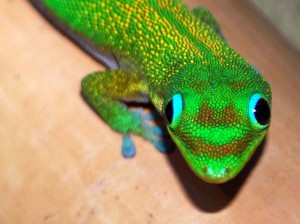Russian space agency Roscosmos issued a number of statements earlier today indicating that their Foton-M4 satellite is in trouble. According to Russian state-owned news agency ITAR-TASS, the scientific research satellite with its payload of experiments is still sending back telemetry, but it's unresponsive to commands sent from the ground. In a separate report, ITAR-TASS quotes a Roscosmos representative as saying that Foton-M4 is designed for "durable autonomous operation," but the lack of ground control jeopardizes the experiments slated to be carried out on board the Foton-M4—not to mention the health of its living cargo.

The lizards aren’t joining the 357-Mile High Club alone; the satellite is carrying an additional biological payload of flies, plant seeds, and assorted microorganisms, along with 850kg of scientific instrumentation to support 22 experiments.
Though the idea of zero-g lizard sex definitely provokes some prurient giggles (and, to be totally honest, coming up with the headline for this piece was the most fun I’ve had all day), sex and reproduction in microgravity are legitimate and extremely relevant topics of study. The increased political focus on long-duration space flights like those that would be needed to reach Mars makes it likely that at some point, actual people will be engaging in intercourse in space; experiments like this help us to understand how the underlying biological processes and mechanisms will work.
And, no, before anyone brings it up: no humans have had sex in space as of today. Hoaxes and rumors notwithstanding, there really hasn’t been much of an opportunity for astronauts or cosmonauts to engage in those kinds of off-the-clock activities, and there’s not a lot of privacy in orbit.
The situation is different for the low-Earth-orbit lothario lizard and his four female friends—assuming the microgravity doesn’t affect them too much, they’ll have plenty of time. The loss of positive ground control for Foton-M4 won’t immediately stop the experiments from continuing, since Roscosmos is still receiving signals from the satellite.
Unfortunately, unless control can be reestablished, the reptile crew will run out of food in about two months (at which point they'll probably all hate each other anyway). Foton-M4 is supposed to be commanded to return to earth after its experiments are concluded, and without ground control the satellite will remain aloft for as long as four months before its orbit decays, long after its consumables have been exhausted.
This wouldn’t be the first time Russia has lost an animal crew, either. Last year, the Bion-M satellite returned to Earth after a month-long mission with the majority of its inhabitants deceased due to a combination of equipment failure and "the stresses of space." As noted in our previous story, Bion-M’s payload of newts was relatively unaffected by their flight—this might be one of the reasons behind the choice of geckos for Foton-M4’s more intimate mission.
reader comments
71